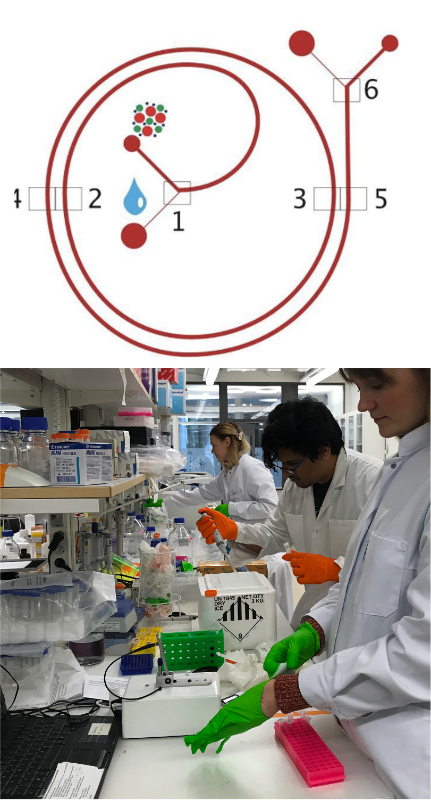Kursen i kliniska tillämpningar av bioteknik ger en orientering om bioteknologiska metoder och mätningar som används inom sjukvården. Kursen ger både teoretisk bakgrund och praktisk tillämpning av analytiska metoder. Kursen omfattar grundläggande kunskaper om molekylära sjukdomsmekanismer, biomarkörer, molekylärbiologiska verktyg och metoder. Nya utvecklingar med potential att integreras i ett kliniskt sammanhang belyses. Kursen innehåller också delmoment om etik med fokus på kliniska tillämpningar.
CB2021 Kliniska tillämpningar av bioteknik 6,0 hp

Kursen tar upp kliniska tillämpningar av bioteknologi för att screena, diagnostisera, och välja behandling. Tillämpningar exemplifieras inom två stora sjukdomar: bröstcancer samt hjärt och kärlsjukdomar. Exempel hur målinriktade behandlingar utvecklats med hjälp av bioteknologi ingår.
Information per kursomgång
Kursomgångar saknas för aktuella eller kommande terminer.
Kursplan som PDF
Notera: all information från kursplanen visas i tillgängligt format på denna sida.
Kursplan CB2021 (HT 2024–)Innehåll och lärandemål
Kursinnehåll
Lärandemål
Kunskap och förståelse
Efter godkänd kurs skall studenten kunna:
- Beskriva grundläggande begrepp inom den bioteknik som tillämpas i kliniken.
- Ge en detaljerad redogörelse för analyser av biologiska prover och relatera till klinisk diagnos och behandling.
- Beskriva kliniska tillämpningar av bioteknik ur ett forsknings- och utvecklingsperspektiv.
Färdigheter och förmågor
Efter godkänd kurs skall studenten kunna:
- Relatera bioteknologiska tillämpningar med underliggande molekylära sjukdomsmekanismer.
- Kunna tillämpa mätning av diagnostiska biomarkörer samt redovisa resultat skriftligt och muntligt.
Värderingsförmåga
Efter godkänd kurs skall studenten kunna:
- Föreslå bioteknologiska applikationer att använda kliniskt samt förklara deras fördelar och nackdelar.
- Reflektera kring klinisk användning av bioteknologi ur ett etiskt, ekonomiskt, ekologiskt och socialt perspektiv.
Kurslitteratur och förberedelser
Särskild behörighet
Avklarat examensarbete 15hp inom teknik eller naturvetenskap, 20hp kurser i bioteknik, 10hp kurser i matematik, och 20hp kurser i kemi. Engelska B/6.
Kurslitteratur
Examination och slutförande
Betygsskala
Examination
- TEN1 - Skriftlig tentamen, 4,5 hp, betygsskala: A, B, C, D, E, FX, F
- LAB1 - Laborationer, 1,5 hp, betygsskala: P, F
Examinator beslutar, baserat på rekommendation från KTH:s handläggare av stöd till studenter med funktionsnedsättning, om eventuell anpassad examination för studenter med dokumenterad, varaktig funktionsnedsättning.
Examinator får medge annan examinationsform vid omexamination av enstaka studenter.
När kurs inte längre ges har student möjlighet att examineras under ytterligare två läsår.
Övriga krav för slutbetyg
Det finns moment med obligatorisk närvaro.
Examinator
Etiskt förhållningssätt
- Vid grupparbete har alla i gruppen ansvar för gruppens arbete.
- Vid examination ska varje student ärligt redovisa hjälp som erhållits och källor som använts.
- Vid muntlig examination ska varje student kunna redogöra för hela uppgiften och hela lösningen.